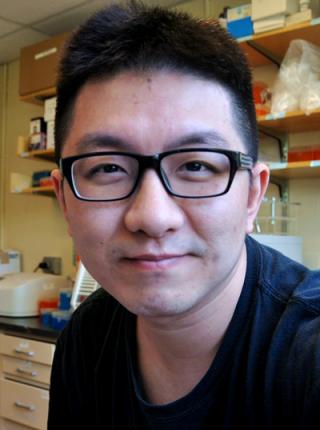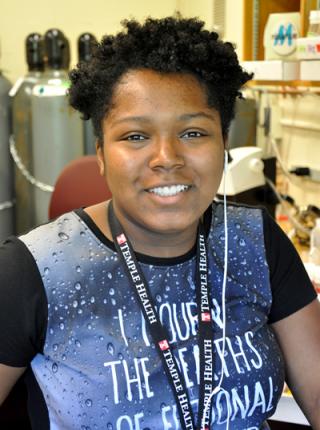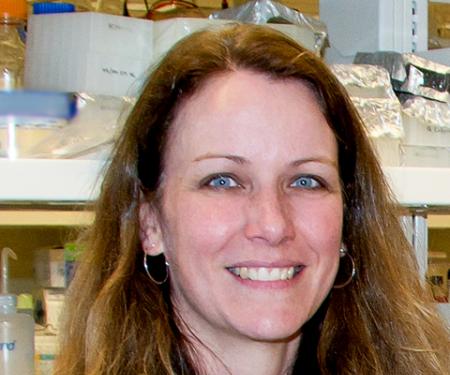This Fox Chase professor participates in the Undergraduate Summer Research Fellowship.
Learn more about Research Volunteering.
Related Articles
00 / 00

This Fox Chase professor participates in the Undergraduate Summer Research Fellowship.
Learn more about Research Volunteering.



Nutritional mechanisms that influence stem cell function and development
Decades of research have demonstrated that a balanced diet is elemental for human health. Malnutrition affects all socioeconomic levels and cultures, with particular impact on individuals in low resource settings. However, our understanding of how individual nutrients effect the cellular changes associated with aberrant states is at its infancy. The underlying hypothesis for our work is that each component of a balanced diet influences signal transduction pathways in target cells, resulting in a collective developmental response within tissues. Our goal is to map the signal transduction pathways targeted by individual nutrients in vivo, in order to build a comprehensive mechanistic understanding of how dietary imbalance affects normal development and identify inexpensive, widely accessible interventions to reduce and treat cancer and other diseases. To do this, we pair a professional laboratory with a large scale citizen science effort. The main lab investigates nutrient impacts on stem cell lifespan and function, utilizing nutrients and signaling pathways identified by thousands of students contributing data through our citizen science efforts. This approach is promoting research as a career among students throughout the Philadelphia region, while driving our understanding of stem cell regulation and dietary intervention for improvement of cancer prevention and treatment.
Decades of research have demonstrated that a balanced diet is elemental for human health. Malnutrition affects all socioeconomic levels and cultures, with particular impact on individuals in low resource settings. However, our understanding of how individual nutrients effect the cellular changes associated with aberrant states is at its infancy. The underlying hypothesis for our work is that each component of a balanced diet influences signal transduction pathways in target cells, resulting in a collective developmental response within tissues. Our goal is to map the signal transduction pathways targeted by individual nutrients in vivo, in order to build a comprehensive mechanistic understanding of how dietary imbalance affects normal development and identify inexpensive, widely accessible interventions to reduce and treat cancer and other diseases.
Cholesterol-mediated Hedgehog signaling
Dietary cholesterol controls stem cell proliferation via Hedgehog (Hh) signaling. Our lab identified a mechanism that translates levels of dietary cholesterol to control proliferation of a single cell population, epithelial Follicle Stem Cells (FSCs), within the Drosophila ovary. Cholesterol levels are sensed by its protein receptor (DHR96) within a subpopulation of ovarian cells that produce the growth factor Hedgehog (Figure 1). In starved flies, Hh is held on the producing cells by the transmembrane protein Boi. Upon feeding, cholesterol binds to its receptor and triggers the activation of a series of proteins to alter the structure of Boi, promoting Hh release and driving stem cell proliferation. Thus, cholesterol consumption regulates the balance between Boi-mediated Hh sequestration and release, allowing for a rapid response to changes in nutrient status and providing a mechanism for controlling egg production rates based on availability of nutrients that assure progeny survival.
Our recently work highlights the essential need for dietary balance in stem cell maintenance. Constant activation of Hedgehog signaling leads to stem cell loss, a process driven by excess autophagy within the stem cells. Properly balanced Insulin signaling, which is activated by sugar and protein, mitigates the effect, reducing autophagy and promoting stem cell lifespan. This work had many surprising twists and turns. We identified a positive, ligand-dependent signaling role for the Hedgehog effector Patched in activation of autophagy, an observation that challenges prevailing views of Patched as a constitutively negative regulator of Hedgehog signaling. Current efforts focus on defining the mechanisms of Patched function in autophagy induction and understanding regulation of this important pathway during stem cell aging.
Stem Cell Communication within the niche
One striking finding from our work is that FSCs exhibit long, axon-like projections that mediate communication between stem cells and other cells within the niche. We recently found a novel signaling cassette that is known to regulate axon-mediated communication in neurons as a key mechanism for determination of stem cell fate. We are moving forward to identify the Hedgehog-dependent communication signals that dictate cell fate, a signaling pathway that is likely to have far-reaching implications in development and cancer.
Regulation of stem cell lifespan
Keeping stem cells alive and healthy is critically important for healthy aging and disease prevention. Diet is an important part of this process, with “healthy diets” maintaining stem cells with slight differences over the long term, to ensure robust responses to environmental changes or injury. We found that Hedgehog signaling controls when stem cells rest (quiescence) or wake up (proliferation), a process that depends on transcription of key Hedgehog target genes after feeding. We are now mapping the impact of interesting targets on this quiescence to proliferation transition and how they affect stem cell aging and health.
Mapping nutrient targets during development
An unusual aspect of our lab is the thousands of high school student trainees who participate directly in our research. The research branch of our Immersion Science program for high school students aims to determine the direct molecular targets of dietary nutrients by determining their developmental effects in varied genetic backgrounds in the fly. Student trainees develop their own projects based on important diseases or dietary practices in their families and communities, expanding the breadth of our scientific questions and working to address egregious health disparities in cancer among under-represented minority and inner city populations. Current projects:
Alexander J.I., Martinez E., Vargas A., Zinshteyn D., Sodi V., Connolly D.C., Hartman T.R., O'Reilly A.M., Cholesterol and cdon regulate sonic hedgehog release from pancreatic cancer cells. J Pancreat Cancer. 7(1): 39-47, 2021. PMC8252898. https://www.ncbi.nlm.nih.gov/pubmed/34235374.
Lee, EH, Zinshteyn, D, Wang, M, Reinach, J, Chau, C, Costa, K, Vargas, A, Johnson, A, Alexander, JI, O’Reilly, AM. Interactions between axon-like projections extended by Drosophila Follicle Stem Cells dictate cell fate decisions. bioRxiv. https://doi.org/10.1101/2020.11.07.372664. 2020.
Simonet, JC, Foster, MJ, Lynch, EM, Kollman, JM, Nicholas, E, O’Reilly, AM., Peterson, JR. CTP Synthase polymerization in germline cells of the developing Drosophila egg supports egg production. Biology Open 9: bio050328. 2020.
O'Reilly A.M. Irreversible effects of youthful choices in aged adults. PLoS Genet. 15(7): e1008218, 2019. PMC6622476.
Singh T., O'Reilly A.M., Autophagy as a beacon and sentry for aging stem cells. Autophagy. 15(4): 740-741, 2019. PMC6526829.
Singh T., Lee E.H., Hartman T.R., Ruiz-Whalen D.M., O'Reilly A.M., Opposing action of hedgehog and insulin signaling balances proliferation and autophagy to determine follicle stem cell lifespan. Dev Cell. 46(6): 720-734.e6, 2018. PMC6159899.
Henry R.A., Singh T., Kuo Y.M., Biester A., O'Keefe A., Lee S., Andrews A.J., O'Reilly A.M., Quantitative measurement of histone tail acetylation reveals stage-specific regulation and response to environmental changes during drosophila development. Biochemistry. 55(11): 1663-72, 2016. PMC4821013.
Hartman, T.R., Ventresca, E.*, Hopkins, A.*, Zinshteyn, D.E., Singh, T., O’Brien, J.A., Neubert, B.C., Hartman, M.G., Schofield, H.K., Stavrides, K.P., Talbot, D. E., Riggs, D. J., Pritchard, C., O’Reilly, A.M. Novel tools for genetic manipulation of Follicle Stem Cells in the Drosophila ovary reveal an integrin-dependent transition from quiescence to proliferation. Genetics, 114.173617 PubMed
Hartman, T.R., Strochlic, T.I., Ji, Y., Zinshteyn, D., O’Reilly, A.M. Diet controls Drosophila follicle stem cell proliferation via Hedgehog sequestration and release. J. Cell Biol. 201:741-757, 2013 PubMed
This Fox Chase professor participates in the Undergraduate Summer Research Fellowship.
Learn more about Research Volunteering.










